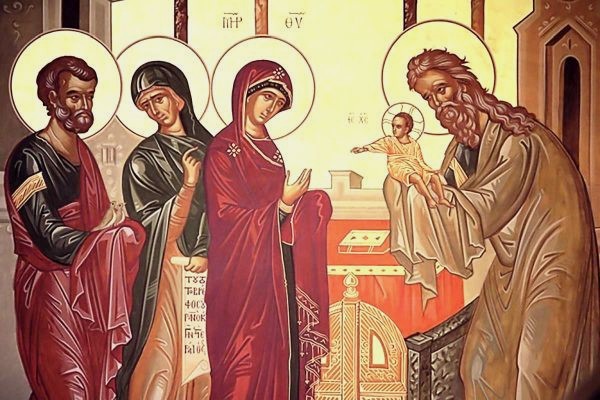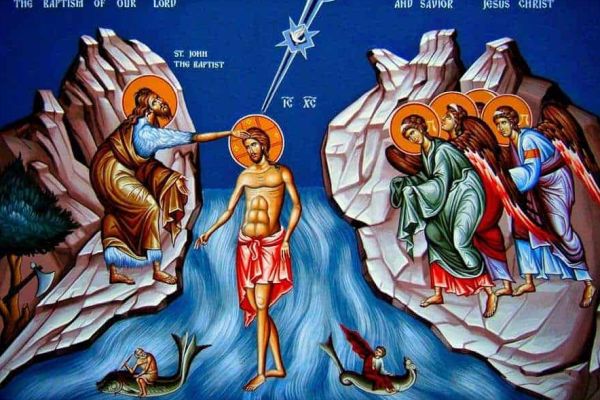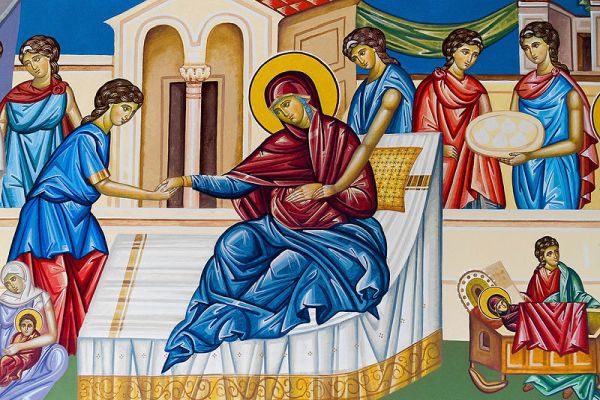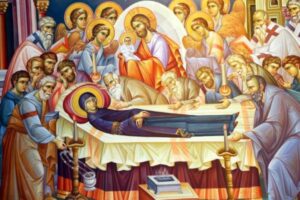The Season of Great Lent
The liturgical year of the Church is populated with feasts and fasts. While the Feasts are many and are considered as times of celebration and commemoration of great events and heroes of the Church, the fasts are few but equally important because they help the faithful to grow stronger in the spiritual sense.
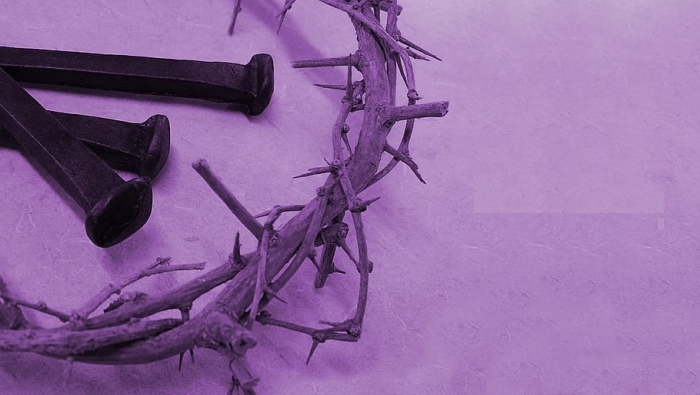
And the greatest of all the fasts of the Church is the Season of Great Lent[1]. This is an annual period of 40 days that precedes Easter. It is observed as a time of fasting and prayer in which the faithful remember the last days of Christ on earth that led to His death, burial and triumphant resurrection.
Duration
The Lenten season begins 40 days before Easter, and since Easter changes every year[2], the dates of the Lent period also change accordingly.
[3]But for the Orthodox Churches, Lent begins on Reconciliation Monday (or Clean Monday) and ends on Lazarus Saturday[4], giving way to the Holy Week, which, though traditionally part of the Lenten season, is a separate season by itself in the liturgical calendar of the Church.
Historical Significance
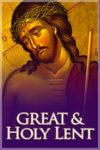
Like with most of the important days of the Liturgical Year, no one knows the exact date when the observance of Lent began in early Christianity. But this Fast is mentioned as early as the 4th century. The Council of Nicea (325), in its disciplinary Canons, noted that two provincial synods should be held each year, “one before the forty days of Lent.”. Then, in the Apostolic Constitutions, the following is mentioned regarding Lent – “after which the fast of Lent is to be observed by you as containing a memorial of our Lord’s mode of life and legislation… and after that begin the holy week of the passover, fasting in the same all of you with fear and trembling, praying in them for those that are about to perish.[5]”
In AD 339, St. Athanasius wrote that the Lenten fast was a forty-day fast that “the entire world” observed. St. Augustine of Hippo (AD 354–AD 430) wrote that: “Our fast at any other time is voluntary; but during Lent, we sin if we do not fast.“
Early Prescriptions of the Fast – The early Church was particular in regard to how the Lent Fast ought to be observed. The Apostolic Constitutions permit the consumption of “bread, vegetables, salt and water” during Lent, with “flesh and wine being forbidden”. The 4th century Canons of Hippolytus further add that only bread and wine may be consumed during the Holy Week. So it is clear that the practice of fasting and abstaining from alcohol, meat and diary products during Lent became established in the Church from ancient times, and is not a mediaeval phenomenon.
How the Church came to observe Lent
Seasons of fasting have always been considered as times of spiritual renewal in the Church. Even in Old Testament Israel, God had instructed His people to have both feasts as well as solemn fasting days like Yom Kippur (Day of Atonement) so that they could prepare themselves to worship Him.
While the New Testament doesn’t give us explicit instructions on fasting, the Lord Jesus did imply that His disciples would fast after His death and resurrection in Mark 2:19, 20. And after the Ascension of the Lord Jesus, His disciples and the Apostles began spending time in prayer and fasting for the needs of the Church and the world[7]. And as the Church began to grow, fasting as a practice began to be prescribed especially for those being baptized. For instance, the Didache, a 2nd-century Christian text, commends “the baptizer, the one to be baptized, and any others that are able” to fast to prepare for the sacrament.
And since Easter was the most preferred time for baptisms, the season of Great Lent began as a preparation for the baptisms of converts to Christianity. In the course of time, the Church began to encourage all the believers to participate in the Lenten Fast and renew their baptismal grace, in remembrance of the example of Christ, who like the ancient Prophets Moses and Elijah, spent 40 days and 40 nights fasting in the wilderness. And so, this is how the Church began to commemorate the 40 days of Lent, as a season of fasting and prayer to remember the final days of Christ’s suffering and His Passion, and also to prepare for the feast of the Resurrection of Christ.
How do we benefit by adhering to the Lenten Fast?
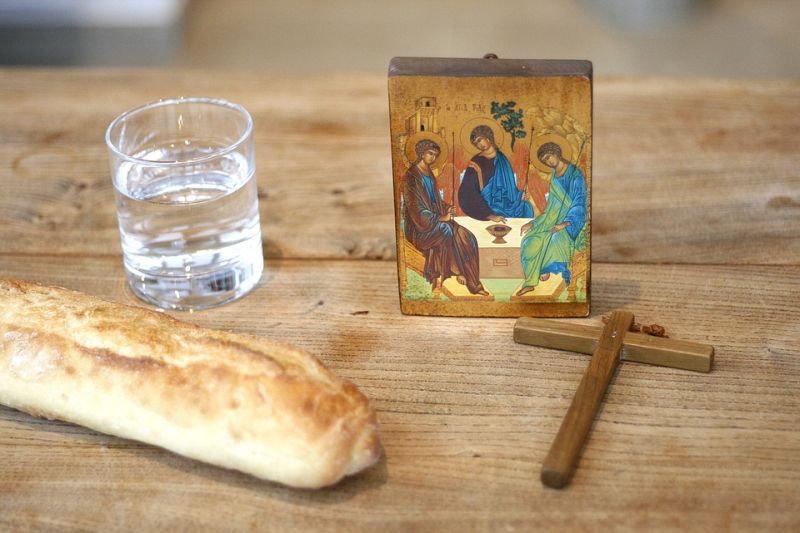
It goes without saying that all of the Church traditions are for our spiritual benefit, including the Season of Great Lent. But still, it is worth mentioning the purposes of the Lenten Fast so that we can remember how beneficial it is for our souls.
Preparation for Easter – The primary purpose of Lent is the preparation of the believer for the celebration of Easter through prayer, repentance of sins, almsgiving, simple living, and self-denial. Contrary to what people normally think of fasting, Orthodox Christians look forward to this season because it helps us to prepare ourselves to celebrate Easter in a worthy manner.
Identifying with the suffering of our Lord: Another main purpose of the Lenten season is to remember the suffering of our Lord and sort of walk alongside Him. That is why during this time, the faithful commit themselves to fasting, as well as giving up certain luxuries as a kind of self-denial or carrying our own cross. By willingly denying ourselves our natural desires, we are able to identify with our Lord Jesus who left the indescribable glories of heaven to become one of us and become our salvation. This is what St. Paul talked about when he wrote to the Philippian Church, “I want to know Christ and the power of His Resurrection and the fellowship of His sufferings, being conformed to Him in His death, and so, somehow, to attain to the resurrection from the dead[8]”.
Spiritual renewal: The goal of the Christian life is ‘theosis’ i.e. to partake of the divine nature. And how we achieve this is by partaking regularly of the sacramental life of the Church, spending more time in prayer and meditation on the Holy Scripture and Holy Traditions of the Church and and so we are being constantly renewed or transformed so that we can become more like Christ in every way. This is what St. Paul referred to as ‘working out our salvation with fear and trembling’[9].
That is why the Orthodox Church always emphasises on asceticism, which is not just meant for monks and hermits but for each layperson as well, according to their strength. During the season of Great Lent, the more we spend time in prayer, reflection, almsgiving and ascetic practices such as denying the self, meditation etc., the more these practices serve as a means to the purification our souls and renew our spirits.
In this sense, the season of Great Lent can be considered as a ‘workshop’ where we as believers get to work on shaping our character so that it reflects the glory of Christ to the world. This season provides each person an annual opportunity for self-examination and improving the standards of faith and morals in his Christian life. The deep intent of the believer during Great Lent is encapsulated in the words of St. Paul: “forgetting those things which are behind, and reaching forth unto those things which are before, I press toward the mark for the prize of the high calling of God in Christ Jesus.[10]“
How we observe Lent
There are two important parts of observing Lent – what we do as individuals and what we do corporately in the form of liturgical observances.
The Lenten Pillars
There are three traditional practices to be taken up with renewed vigour during Lent. These are known as the three pillars of Lent, and are meant for every faithful member of the Church to uphold.
1. Prayer: During the Lent season, we are called to spend more time in prayer. And the more time we spend in prayer to our Heavenly Father, the more we are called to change ourselves so that we fulfil His will in our lives, as it always is in Heaven.
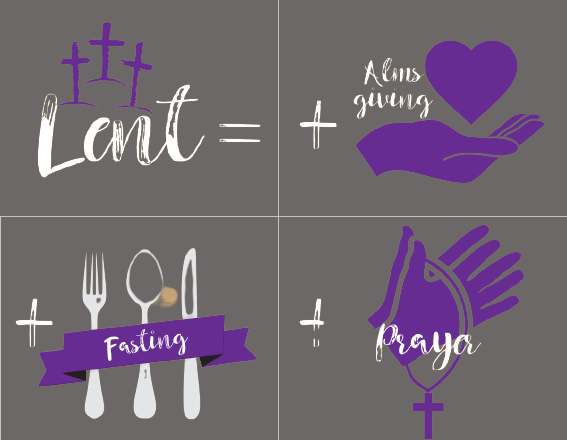
2. Fasting: We are called not only to fast from food but from all sinful habits. We must ensure that we are not enslaved to our passions but master them, so that we will be able to have more of the divine nature within us.
3. Almsgiving: In Isaiah 58:7, we see that the fast that pleases God is where we take care of the needs of the poor and oppressed. One of the reasons we fast during the Lent season is to save money and resources which can then be shared with the needy. Unless we share with those in need around us, our fasting will never be pleasing to God.
In addition to these three pillars, there are also several other important qualities like self-reflection, simplicity, and sincerity and honesty, which are emphasised during the Lenten season.
Fasting Guidelines
The traditional fasting guidelines that the Orthodox Church has followed from ancient times are the same – to avoid meat, alcohol and dairy products. Like it is followed in all monasteries, the faithful are encouraged to avoid one or more meal times every day during the season, to spend the gained time in prayer. However, exceptions are permitted, especially in the case of the elderly, pregnant and nursing mothers, and those who are weak or sick. The faithful are encouraged to inform their difficulties to their parish priest and avail exceptions from the Fast with his blessings.
Traditionally, the Church Fathers recommend that someone new to fasting begin by resolving to faithfully do as much as he or she is able during the Lenten period. Each year as one matures as a Christian, a fuller participation can be undertaken. However, it would not be obedient or wise for anyone to try and create their own rules for fasting, since. The Faithful are encouraged to consult with their priest or bishop regarding the Fast when possible.

Why do we fast? The Scripture teaches us that , “Man does not live by bread alone” or in other words, that the needs of the body are nothing compared to the needs of the soul. And so fasting teaches us to depend on God above all else, Who provides everything for both the body and the soul. And so, fasting.
Fasting is also considered as a form of humbling oneself before God in order to seek His mercy. Also, when we fast, we get more time to spend in prayer and at the same time, we are able to save money which can be used to help the poor. And again, when we practise fasting and control over our dietary habits, we are disciplining ourselves, and this helps us to have more control over our unruly desires..
Fasting in every sense: Fasting is not for the stomach alone. The other members of the body also need to fast: our eyes from seeing evil, our ears from hearing evil, our limbs from participating in anything that is not of God. Most important of all, we need to control our thoughts, for thoughts are the source of our actions, whether good or evil.
Fasting must be accompanied with prayer: Remember that fasting is more than simply abstaining from certain foods. During the Great Lent, we are called to intensify our prayers and spiritual exercises, along with our Fast. Some tend to think that they can avoid certain kinds of food and still follow Lent. The Church Fathers have referred to fasting without prayer as “the fast of the demons” since the demons do not eat as they lack physical bodies, but neither do they pray.
So during the season of Great Lent, we must pay closer attention to our private prayer life. In addition to that, our Fast must include going to church services more often, studying the Scriptures and the works of the Church Fathers in depth, limiting our entertainment and spendings so that we can focus on charity and good works.
Liturgical Observances
There are a few unique features that mark the liturgical services of the Great Lent season.
Eucharist only on Sundays – The services of the Great Lent season are unique in that the Eucharist is only celebrated on Sundays during this period and not on other days. The reason for this is because the joy of the Eucharist (literally “Thanksgiving”) is contrary to the attitude of repentance which predominates on the days of Lent. This is kind of a ‘liturgical fasting’ period. Besides, Sundays are not traditionally included among the Lent days, as they always remind us of the Resurrection.
Special Prayers and Readings – During the days of Lent, there are special services every day so that the faithful can gather corporately for prayer. During these services, there are special Lenten texts and prayers that are used which help us understand more about the need for repentance and spiritual growth. The one prayer that typifies the Lenten services is the Prayer of St. Ephrem, which is accompanied by full prostrations –
“O Lord and master of my life! a spirit of idleness, despondency, ambition and idle-talking, give me not. But rather, a spirit of chastity, humble-mindedness, patience and charity, bestow upon me Thy servant. Yea, my king and Lord, grant me to see my own failings and refrain from judging others: For blessed art Thou unto ages of ages. Amen[11].
The public reading of Scripture is also increased during Great Lent. Readings from the Old Testament are also increased, with the Books of Genesis, Proverbs and Isaiah being read through almost in their entirety.
Prostrations: One of the gestures that characterises the Lent season is increased prostration and genuflections (bending the knees). That is because inward repentance is shown visibly through our physical behaviours like bowing down and lying prostrate in the presence of the Lord. This is the reason why in the liturgical services of the Lent Season, the faithful are frequently asked to kneel down and prostrate themselves in prayer.
Reconciliation: One of the most important goals of the Lent Season is to help us not only love God more, but our neighbor as well. And so, the Lent season is instituted in such a way to help us be reconciled to our fellowmen. That is why the first day of Lent is called ‘Clean Monday’[12] or ‘Reconciliation Monday’. In the orthodox tradition, the services on this first day of Lent usually begin with the ‘Forgiveness’ or ‘Reconciliation’ services, where all present will bow down before one another and ask forgiveness. Another important sacrament that is stressed during this season is Confession; the faithful are encouraged to make regular confession and so be reconciled to God and His Church.
Personally Commit Yourself to the Fast
The Season of Lent is designed for the benefit of our souls. But it will not do us any good if we don’t willingly and actively participate in it. So, as members of the Body of Christ, let us along with our families do all we can to observe this season so that we may grow more into the fullness of Christ.
Here are some things that we must commit ourselves to as Christians.
1. Participate: Let us seek to participate in as many of the liturgical services as possible, along with our families. Look over the liturgical calendar and plan for the upcoming services.
2. Keep the Fast: Strive to keep the fast as the church directs us to keep it. Don’t make concessions or bargains with yourself on how you will keep it. After that, talk with your spouse and children about your expectations and decide as a family what you will do and what your expectations are.
3. Confession: Please make sure to confess our sins regularly and as frequently during this holy season.

4. Educate: Talk with your kids about the fast. Educate them and let them participate in the fast as well.
5. Prayer@home: Lent is the time for increased prayer and this must occur in our homes as well. Let us make sure that the family altar and prayers at home continue without fail during the Lent season as well.
6. Share: Give to the poor and needy, especially widows and orphans, and also those members in your parish who may not be as fortunate as you are.
7. Limit the unnecessary – During this season, let us avoid or limit all forms of entertainment that take our time and attention away from God – TV, Social media, computer games, friends etc.
8. Develop spiritual habits – Seek to get up early to spend more time in prayer during this season. If getting early is not practical, you can choose to stay up late to pray. Pick a spiritual book to read, like the Faith and Tradition series of our Church. Our Metropolitan has written two resources for Lent – one is ‘The Season of Lent’ and the other is a Lent Devotional ‘Journey with Jesus to the Cross’.
9. Seek Solitude – Try to find time to spend alone in prayer. The Jesus Prayer is one such prayer that we can praying more and repetitively throughout the day. Also spend time to reflect on the journey of our lives, and ask God’s help to redirect your life, so that it will draw you and your family closer to Him.
Conclusion
This Lenten season is an annual season of repentance instituted by the Church so that we can continue upwards on our spiritual journey with our Lord and Saviour, Jesus Christ – to meet God our Father who is always waiting to greet us with outstretched hands.
And during the season of Great Lent, the Church teaches us how to receive Him by using the three Lenten pillars — prayer, fasting and almsgiving. So let us prepare ourselves and our families to join with the Body of Christ worldwide as we set out on this spiritual journey of 40 days. In preparing ourselves to celebrate Easter, we are actually preparing for our own personal Easter because we will also be resurrected from the dead one day and so inherit the eternal life that God has prepared for each one of us who are faithful Christians.
[1] Lent comes from an old English word ‘lencten’, which means ‘spring season’. It is called so because it usually coincides with the spring season. At the same time, it also signifies the spiritual spring season of our lives, as the time of prayer and repentance that characterizes this Fast helps in the renewal and growth of our spiritual lives.
[2] Easter is a movable feast which falls on different dates each year because it is calculated according to the determination of the position of the moon and spring equinox, which is based on the original setting during the last Events of the life of Christ on earth.
[3] There are some variations in the way Lent is observed in some parts of Christianity. In the Western Churches, Lent begins on Ash Wednesday and usually concludes on Maundy Thursday. For some other denominations, Lent ends at sundown on Holy Saturday, when the Easter Vigil is celebrated.
[4] Lazarus Saturday is the Saturday that comes just before Hosanna Sunday. On this day, the Church commemorates Christ’s raising of Lazarus from the dead, as a prelude to what would happen on the original Easter Sunday.
[5] Apostolic Constitutions, Book V, XIII – from https://www.newadvent.org/fathers/07155.htm
[6] Mark 2:19, 20.
[7] Acts 13:2 mentions the disciples in Antioch praying and fasting before the Lord. In Acts 14:23, St. Paul and St. Barnabas fasted before ordaining elders in each of the churches they planted.
[8] Philippians 3:10-11.
[9] Philippians 2:12.
[10] Philippians 3:13-14
[11] https://en.wikipedia.org/wiki/Prayer_of_Saint_Ephrem
[12] It is called so because the faithful are called to begin the Fast with clean hearts and good intentions.
